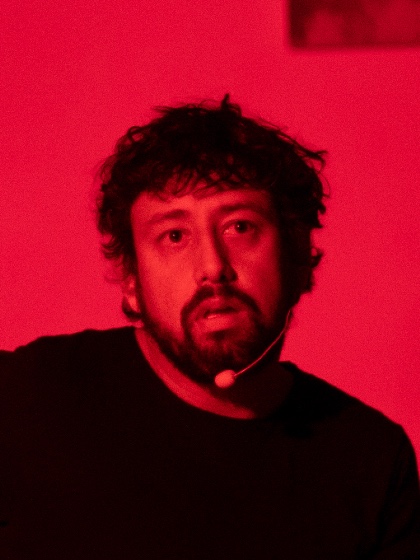I. (Icaro) Lopez de Mesa Moyano

SONIC TREASURES OF THE SUN
MUSIC AND SOUND INSTRUMENTS PROVIDING ALTERNATIVES TO THE AGENCY OF GOLD USED IN ELECTRONICS
Through critical instruments related to music and sound, this research enquires into artistic and technological alternatives that allow for reflection and reconstruction when confronting the problems caused by the extraction of minerals, focusing specifically on gold for the production of digital-electronic infrastructure.
Minerals and electrical energy sustain the life of data and the flow of computation. The digital-electronic world, which is sold to us as wireless and remote, requires an enormous number of devices that imply materiality and physical infrastructure, such as microchips, wires, and connectors. The internet and its connectivity have physicality, such as long fiber-optic cables, while the cloud and artificial intelligence need computational power, electricity, and sophisticated machines built with natural resources. The abuse of “nature”, and the excessive production of electronic components and equipment, running at the rapid pace expected in capitalism, make our consumption collapse the world we inhabit and have detrimental effects upon the most vulnerable communities and regions.
The agency of electronics’ materiality, which revolves around the ways they are produced and consumed, has at its core the exploitation of the territories and communities that provide raw materials (Witzgall/Stakemeier, 2014). One of these, gold, which has been a fundamental element of the colonial past and present, for instance in countries such as Colombia (Posada Tamayo, 2022). The search for it, has ended millions of indigenous and black community lives, and Chocó, is one of the regions most affected by territorial exploitation in Colombia where gold mining is a major factor of economy. At the same time, in connection with my artistic practice, it is one of the places where a great wealth of musical rhythms proliferates: currulao, juga, bunde, and salsa choque are some of them. In the Chocó region, musical and ancestral traditions are a cultural axis of social and environmental interaction, and this artistic research is seeking for connections between the extraction of gold, the production of electronic instruments and music.
Gold is important to this investigation, because of all conductive minerals involved in digital processes, historically, it has been a symbol associated with the sacred, the divine, religions, and science, as well as with money, power, treasures, and hence, with robbery. This precious material, remains one of the most expensive metals in the world, nonetheless, most electronics, such as audio devices, contain at least some of it because of the quality it provides, owing to its high capacity as an electrical conductor. Therefore, it is crucial to decipher how and why such a desirable and reliable mineral is so dangerous to the communities and the soil it is extracted from. (Cusicanqui, 2018)
This artistic research will focus on sound and music practices and critical instruments to understand, the actor network in which gold, as a non-human, is a material element of equal value and has agency as humans do. (Latour, 2005). For this purpose, it is essential to study the socio-material aspects related to its extraction, and the interconnections with gold's role in electronic instruments. It is also an interest of this inquiry to analyze the meeting points between the scientific and the mythological, where, for instance, the sun is a relative to gold, goods, and technology. (Santos, 2019)
Supervised by Prof. Dr. Andrea Sick, Prof. Dr. Ann-Sophie Lehmann, Dr. Sara Stranvad, Dr. Chris Tonelli. collaborator Prof. Dennis P Paul
PhD project of the Binational Artistic PhD Programm of HfK Bremen in cooperation with RUG and the Faculty of Arts.
